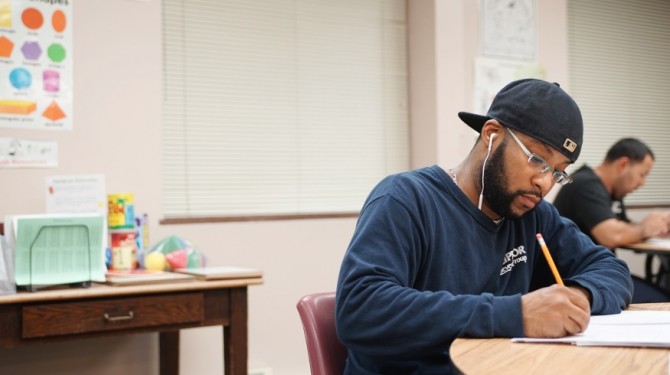3 Key Differences Between Adult and Youth Learners

It’s no surprise that working with an adult learner is different than working with a youth learner. Being at different stages of life means that they have different experiences to draw from and different expectations for their learning.
As an adult literacy organization, we train our volunteers on the differences of working with adult students versus youth students, especially since a number of our tutors are retired primary or secondary educators. It’s important to be aware of the particularities of adult learners so that we can utilize the best approaches to ensure a cooperative and fruitful learning experience.
1. They have life experience
Adult learners have much more life experience than youths. They’ve learned a lot from their experience, and they continue to learn by building on what they already know. Because of this, there is a greater pool of examples you can likely pull from to illustrate a lesson. For example, a child doesn’t know what it’s like to balance a family budget, but an adult does.
By tying a lesson to something practical and personal, the connection between the material and the experience makes the learner more engaged. The more experience an individual has, the more connections there are to make.
2. They may feel unsure, embarrassed, or afraid
The position of not knowing something may feel different as an adult than as a young learner.
As children, we are expected not to know things. We spend hours a day in school surrounded by other learners, with dozens of people dedicated solely to teaching us, exactly because we don’t know things. We don’t even question the process.
As an adult, there’s an assumption that you already know a lot of things. So when you’re missing that foundational knowledge, it can lead to feeling embarrassed and insecure.
As a result, adults may be hesitant to ask questions that reveal what they don’t know, or they might be reluctant to work through a problem and get something wrong. They may also pretend that they already know something, avoid explaining or paraphrasing the lesson themselves, or become agitated when it starts to become apparent they don’t understand something.
A tutor in that situation may want to pose the question as something she doesn’t know herself, or talk in “we” to show that they learning together. For instance, simply saying, “What if we try this?” or, “That’s a lot of information. How can we break that down?” can help reassure the adult that it’s okay not to know and that you’re learning with them.
3. They need respect
Hopefully we already treat everyone with respect, from youth learners to strangers, but respect manifests in particular ways when it comes to adult learners. It means not looking down on the person for what they don’t know, and not assuming what they do and don’t know.
We also need to value the knowledge that they do have. A particular adult learner may not know yet how to graph an inequality or identify an adverb, but he may know how to budget their income to feed a family or know the ins-and-outs of the bus routes.
Further, adults have their own values and beliefs that need to be respected. Again, we can’t assume what they think or what their lives have been like. We need to value the individuality and ideas of youth learners, but adults in particular have strong opinions and long-held belief systems that, while we may not know or hold ourselves, we nonetheless need to respect. This involves not assuming the adult learner shares your opinions or doesn’t have any ideas of their own.
When we approach adult learners mindful of their varied experience, agency, and emotions, we can create a more welcoming and productive interaction for them as they learn and grow.
Support our adult learners by volunteering or donating to Seeds of Literacy today.
